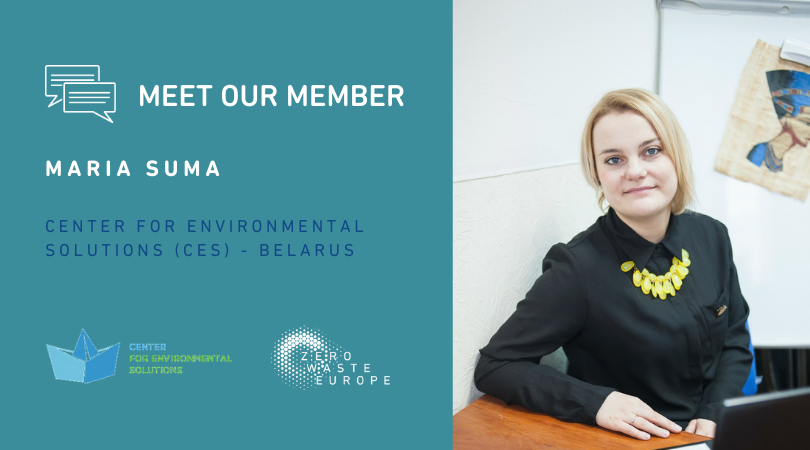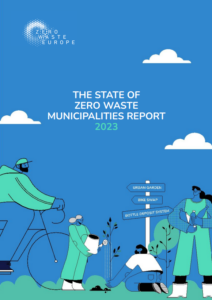Meet our members – Center for Environmental Solutions

Zero Waste Europe is happy to introduce the blog series “Meet our members”. Through this series of monthly interviews, we want to give you a chance to get to know our members and the work they are doing.
Meet Maria Suma from Center for Environmental Solutions (CES), Belarus
Hi Maria, can you give us a brief introduction to Center for Environmental Solutions‘s focus?
The Center for Environmental Solution (CES) mission is to promote an environmentally friendly lifestyle and principles of sustainable development and international cooperation for the conservation of the environment.
CES supports sustainable waste management, promotes the idea of preventing excessive waste and the need for re-use, promotes the concept of zero waste in production and consumption. We are engaged in the promotion of separate collection and recycling of waste in Belarus. Currently, we are also implementing pilot projects for waste steems that have not been collected in Belarus before, for example, organic waste, pharmaceuticals and textile waste.
How long have you been in the field and what got you into (zero) waste?
I got into zero waste when I was working on an online project focused on separate collection and recycling called greenmap.by. I understood very quickly that recycling wouldn’t solve the waste problem. Therefore, Ana and I tried to look at the source of the problem and realised that we had to do something to prevent the production of waste in the first place. That is why for almost 4 years now, I have been working on the topic of zero waste in Belarus.
During this time, a couple of dozen zero waste stores or shelves with zero waste products has appeared in Belarus, which indicates a growing demand to change and adopt a zero waste lifestyle. Chain stores are also initiating activities to promote alternative packaging such as reusable or biodegradable bags. Also, activities to reduce the use of plastic have become popular in various communities. Today, more than 20 schools are implementing the Plastic-Free School initiative. The idea of abandoning single-use plastic has also been developed on the basis of Sunday-church schools in church parishes. There are cafes that have completely eliminated the use of plastic at the customer and business levels. Thus, in Belarus, an infrastructure for a waste-free lifestyle is gradually being formed, thanks to the efforts of individual activists and small businesses (for now).
What is your current role in the organisation?
At the moment, I mostly focus on working on plastic-free initiatives and related legislation. Despite the fact that since 2020 there has been a tendency to restrict the use of plastic in public gatherings and events, the volume of waste hasn’t decreased yet as many of the alternatives remain tableware made of compostable goods, which are not recyclable or completely degradable in the environment. Therefore, there’s still much to do to move even further on the path towards zero waste and to make reuse and refill mainstream.
Tell us more about one ongoing campaign/activity you’re working on?
At the moment we are working on a campaign to make refill popular and accessible in the city of Minsk. We are working not only with the public but also with small businesses, representatives of cafes and restaurants, which can become refill points.
The target group of the campaign is also the Government and local authorities, which, within the framework of their activities, could create more public refill points to access public water, such as fountains. Currently, we are gathering examples from other countries in the area.
If there was one thing that you would like your organisation to be known for, what would it be?
Our organisation has always been known for raising awareness around new topics in Belarus. For example, we were the first, who has talked about microplastics, the need for a separate collection of expired drugs, and the urgent need to prioritize a zero waste approach to waste management.
We would like to be perceived as professionals and innovators in the environmental field in Belarus.
How would you describe the growth of the Zero Waste movement in your country? What is your perspective for the future?
In the current social and political situation in Belarus, it is difficult to talk about the growth of the movement. But the work that has been done and the community of like-minded people that has been created will quickly restore the results achieved. I think in the future we will pay more attention to zero waste cities and develop cooperation with global networks, especially around the topic of refill and reuse.
Everyone’s contribution is important, and only together we can achieve change
You can find more about CES and their work here.


